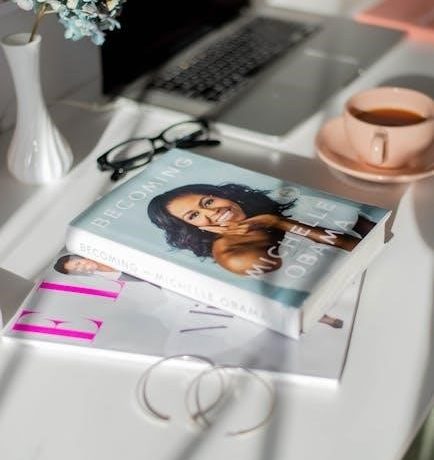Dr. Laurie Mintz’s Becoming Cliterate tackles the orgasm gap, challenging traditional sexual narratives and empowering women to reclaim their pleasure. A must-read for sexual equality.
1.1 Overview of the Book and Its Importance
Becoming Cliterate by Dr. Laurie Mintz is a groundbreaking book that addresses the orgasm gap, a pervasive issue where women experience fewer orgasms than men in heterosexual relationships. Mintz, a psychology professor and sex therapist, combines research from biology, sociology, and sex therapy to uncover the cultural and psychological barriers to women’s sexual pleasure. The book challenges traditional narratives about sex, emphasizing the importance of cliteracy and orgasm equality. By providing practical advice and empowering insights, Mintz aims to redefine sexual education and promote a more equitable understanding of sexual satisfaction for all.

1.2 Author Background: Dr. Laurie Mintz and Her Expertise
Dr. Laurie Mintz is an esteemed psychology professor at the University of Florida, specializing in human sexuality. With extensive experience as a sex therapist and educator, she has empowered countless individuals through her teachings and writings. Her expertise spans sexual health, gender issues, and relationship dynamics. Mintz’s work emphasizes evidence-based approaches to enhance sexual well-being, making her a trusted voice in the field. Her book, Becoming Cliterate, reflects her dedication to promoting sexual equity and challenging societal norms.

The Orgasm Gap: A Key Concept in the Book
The orgasm gap refers to the disparity in orgasm frequency between men and women, highlighting unequal sexual satisfaction in heterosexual relationships, a central focus of Dr. Mintz’s work.
2.1 What is the Orgasm Gap?
The orgasm gap refers to the significant disparity in orgasm frequency between men and women, particularly in heterosexual relationships. Dr. Laurie Mintz highlights that while men often achieve orgasm consistently, many women struggle to do so, even in committed partnerships. This gap is not merely biological but deeply influenced by cultural, psychological, and societal factors. Mintz argues that it is a universal issue, often overlooked, and emphasizes the need to address it for sexual equality. Her work sheds light on this disparity and advocates for change.
2.2 Biological and Psychological Factors Contributing to the Gap
Biological factors, such as differences in sexual anatomy and physiology, play a role in the orgasm gap. The clitoris, essential for female pleasure, is often overlooked in heterosexual encounters. Psychologically, women may face challenges like decreased sexual entitlement and mental distraction, impacting their ability to orgasm. Societal pressures and stigma surrounding female sexuality further exacerbate these issues, creating a complex interplay of factors that hinder sexual satisfaction for women. Dr. Mintz emphasizes understanding these elements to bridge the gap.
2.3 Cultural and Societal Influences on Women’s Sexual Pleasure
Cultural and societal norms have historically marginalized women’s sexual pleasure, perpetuating the orgasm gap. Media and pornography often prioritize male pleasure, reinforcing unequal sexual expectations. Traditional gender roles and stigma surrounding female sexuality discourage open conversations about women’s desires. Dr. Mintz highlights how these influences create a barrier to orgasm equality, emphasizing the need for a cultural shift to value and prioritize women’s sexual satisfaction equally in relationships and society;

Redefining Sex: Moving Beyond the Penis-Vagina Narrative
Dr. Mintz challenges traditional sexual narratives, emphasizing cliteracy and expanding definitions of sex beyond penetration. This shift fosters inclusivity, equity, and broader understanding of sexual pleasure.

3.1 Challenging Traditional Definitions of Sex

Mintz critiques the narrow, penis-vagina centered view of sex, advocating for a broader definition that prioritizes pleasure and clitoral stimulation. This challenges societal norms and media portrayals that often marginalize female pleasure, emphasizing instead the importance of mutual satisfaction and diversity in sexual experiences.
3.2 The Role of Cliteracy in Expanding Sexual Understanding
Cliteracy, as defined by Dr. Mintz, involves understanding the clitoris’s central role in female pleasure. By educating both men and women about clitoral anatomy and stimulation techniques, cliteracy dismantles myths and promotes equitable sexual experiences. This knowledge empowers individuals to prioritize female orgasm, fostering a culture of mutual satisfaction and respect in relationships. Mintz emphasizes that cliteracy is not just about biology but also about challenging cultural norms that have historically overlooked women’s sexual needs.

The Importance of Masturbation and Self-Love
Masturbation is a powerful tool for self-discovery and sexual empowerment, helping women overcome stigma and embrace their bodies. Dr. Mintz advocates for self-love as a pathway to heightened pleasure and confidence.
4.1 Breaking the Stigma Around Masturbation
Dr. Laurie Mintz emphasizes the importance of dismantling the societal stigma surrounding masturbation, which often leads to feelings of guilt and discomfort. She advocates for a shift in perspective, recognizing masturbation as a natural and essential part of sexual health. By normalizing self-exploration, individuals can gain a deeper understanding of their bodies and desires. Mintz challenges outdated cultural norms, encouraging open conversations about masturbation as a pathway to empowerment and sexual satisfaction. Her approach fosters self-acceptance and autonomy, helping women reclaim their bodies and embrace their sexuality without shame.
4.2 How Self-Exploration Enhances Sexual Satisfaction
Self-exploration is a cornerstone of sexual empowerment, as highlighted in Becoming Cliterate. By understanding their bodies, women can identify their preferences and communicate them effectively to partners. This knowledge boosts confidence and intimacy, leading to more fulfilling experiences. Mintz underscores that masturbation isn’t just personal pleasure—it’s a tool for education and connection, fostering a deeper understanding of oneself and enhancing overall sexual satisfaction in relationships.
Communication Strategies for Better Sexual Relationships
Open dialogue is key to achieving orgasm equality. Encouraging honest conversations about needs and desires fosters intimacy and trust, leading to more satisfying and equitable sexual experiences.
5.1 The Role of Open Dialogue in Achieving Orgasm Equality
Open dialogue is a bridge to intimacy and trust, fostering mutual understanding of desires and needs. By prioritizing honest communication, partners can address disparities in sexual satisfaction, promoting equality. Dr. Mintz emphasizes that speaking openly about pleasure and boundaries is essential for breaking down barriers that contribute to the orgasm gap. Culturally, we must shift from viewing sex as taboo to embracing it as a topic for open, respectful conversation. This shift not only enhances individual experiences but also paves the way for societal change;
5.2 Practical Tips for Improving Communication with Partners
Dr. Mintz offers actionable strategies to enhance communication, such as using “I” statements to express desires without blame and actively listening to understand each other’s needs. She suggests setting aside dedicated time for open conversations about sexual preferences and boundaries. Creating a safe, non-judgmental space fosters trust and encourages vulnerability. These practices not only deepen intimacy but also empower both partners to advocate for their pleasure, leading to more fulfilling and equitable sexual experiences.
Cultural and Historical Contexts of Women’s Sexuality
Dr. Mintz examines how historical suppression and societal norms have restricted women’s sexual expression, highlighting the impact of cultural conditioning and media on perceptions of female pleasure.
6.1 Historical Suppression of Women’s Sexual Pleasure
Dr. Mintz traces the historical suppression of women’s sexuality, revealing how systemic oppression and patriarchal norms have silenced female pleasure. From ancient myths to modern taboos, women’s sexual desires have been marginalized, contributing to the orgasm gap. Mintz argues that these deeply rooted cultural attitudes have perpetuated inequality, limiting women’s access to sexual satisfaction and autonomy. By examining these historical contexts, Becoming Cliterate sheds light on the societal conditioning that has stifled women’s sexual liberation for centuries, urging a reclamation of their rightful pleasure.
6.2 The Impact of Media and Pornography on Sexual Expectations
Mintz critiques how media and pornography shape unrealistic sexual expectations, often prioritizing male pleasure over female satisfaction. These portrayals perpetuate the notion that sex revolves around male orgasms, marginalizing women’s desires. By examining these influences, Becoming Cliterate highlights how such narratives contribute to the orgasm gap. Mintz advocates for a shift in representation, emphasizing the need for diverse and inclusive depictions of sexuality to promote orgasm equality and redefine societal norms around sexual pleasure.
Overcoming Obstacles to Sexual Satisfaction
Mintz addresses personal and societal barriers to sexual fulfillment, emphasizing empowerment through education, self-acceptance, and open communication to achieve orgasm equality and mutual satisfaction.
7.1 Addressing Body Image and Sexual Entitlement
In Becoming Cliterate, Dr. Mintz highlights how negative body image and societal beauty standards can hinder sexual satisfaction. She emphasizes the importance of embracing one’s body and fostering self-confidence. Mintz also explores the concept of sexual entitlement, advocating for women to view orgasm as a right, not a privilege. By challenging these deeply ingrained beliefs, individuals can overcome barriers to pleasure and cultivate a healthier, more empowering approach to sexuality. Mintz provides practical strategies to reframe mindset and embrace sexual entitlement.
7.2 The Role of Education in Empowering Women Sexually
Education plays a vital role in empowering women sexually, as highlighted in Becoming Cliterate. Dr. Mintz advocates for comprehensive sexual education that goes beyond basic biology, emphasizing cliteracy and pleasure. By debunking myths and providing accurate information, education helps women understand their bodies and reclaim their sexual agency. Mintz also stresses the importance of dismantling shame and fostering open conversations about sex. Empowered by knowledge, women can navigate their sexuality with confidence, leading to greater satisfaction and equality in relationships.
Empowering Women and Promoting Orgasm Equality
Becoming Cliterate emphasizes the importance of promoting orgasm equality by empowering women to understand and assert their sexual needs, fostering mutual satisfaction in relationships.
8.1 The Role of Men in Supporting Women’s Sexual Pleasure
Dr. Laurie Mintz emphasizes that men play a crucial role in promoting women’s sexual satisfaction. By actively engaging in open conversations, men can help break down stigmas and misunderstandings. Education is key; men who understand female anatomy and the importance of clitoral stimulation can better support their partners. Mintz advocates for mutual respect and communication, encouraging men to view themselves as allies in achieving orgasm equality. This collaboration fosters a more equitable and fulfilling sexual experience for both partners.
8.2 Building a Culture of Sexual Equity and Respect
Dr. Laurie Mintz advocates for a cultural shift toward sexual equity and respect, emphasizing the need to dismantle harmful stereotypes and societal norms. By promoting open dialogue and education, individuals can challenge outdated beliefs about sexuality. Mintz highlights the importance of normalizing conversations about sexual health and pleasure, fostering an environment where consent and mutual respect are prioritized. This cultural transformation empowers both men and women to embrace their sexuality freely, leading to more equitable and satisfying relationships.
Dr. Laurie Mintz concludes by urging readers to embrace sexual equity and empowerment. She calls for collective action to redefine societal norms and promote orgasm equality, fostering a culture of respect and inclusivity for all.
9.1 Key Takeaways from the Book
Becoming Cliterate emphasizes the importance of addressing the orgasm gap and promoting sexual equity. It highlights the need for cliteracy, challenging societal norms that suppress women’s pleasure. The book advocates for open communication, self-exploration, and education as tools for empowerment. By dispelling myths and fostering understanding, Dr. Mintz equips readers with the knowledge to reclaim their sexuality and advocate for a culture of respect and equality.
9.2 Steps Toward Creating a More Sexually Equitable Society
Dr. Mintz advocates for education, open dialogue, and cultural shifts to achieve sexual equity. Promoting cliteracy, challenging stereotypes, and encouraging self-exploration are key. Empowering women to prioritize their pleasure and fostering partnerships based on mutual respect are essential. By addressing systemic biases and normalizing conversations about sex, society can move toward a future where orgasm equality is the norm, benefiting all individuals and relationships.
